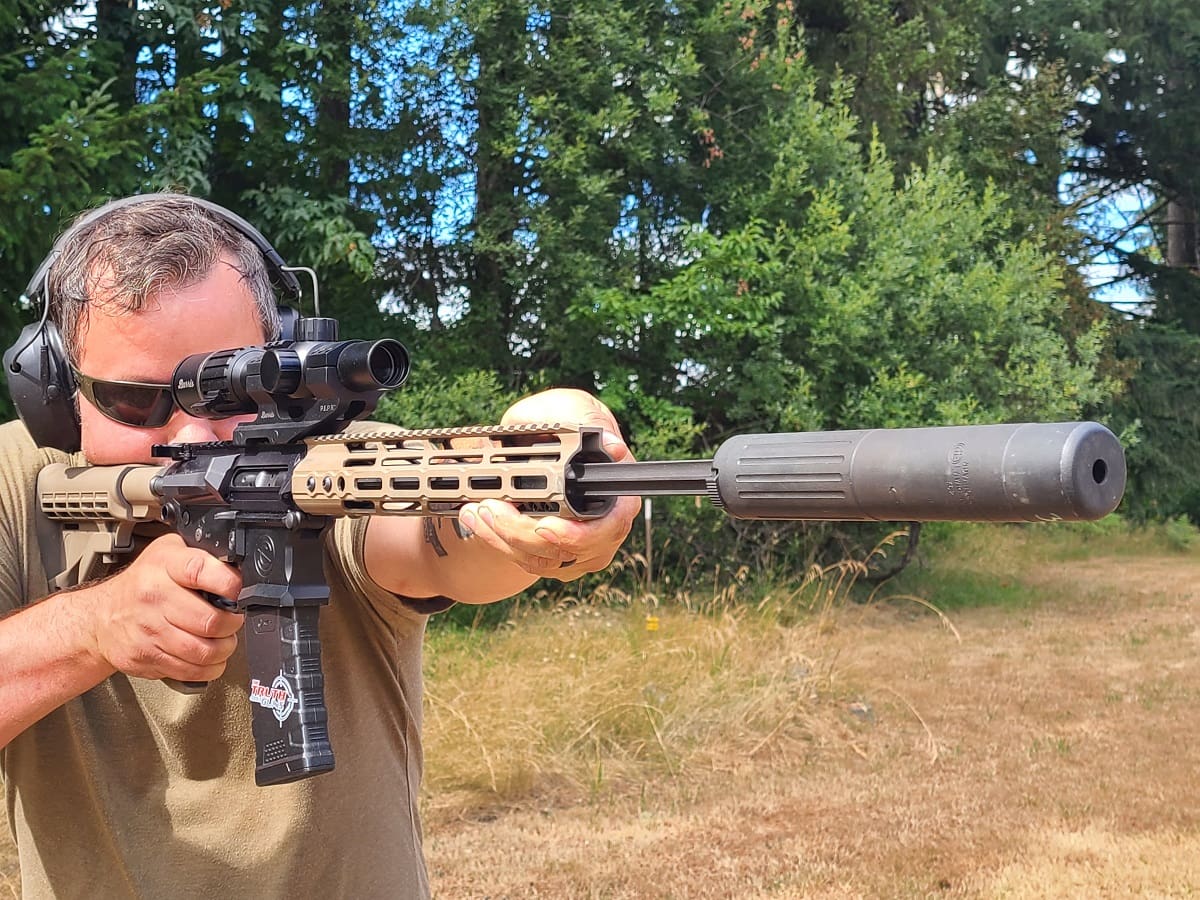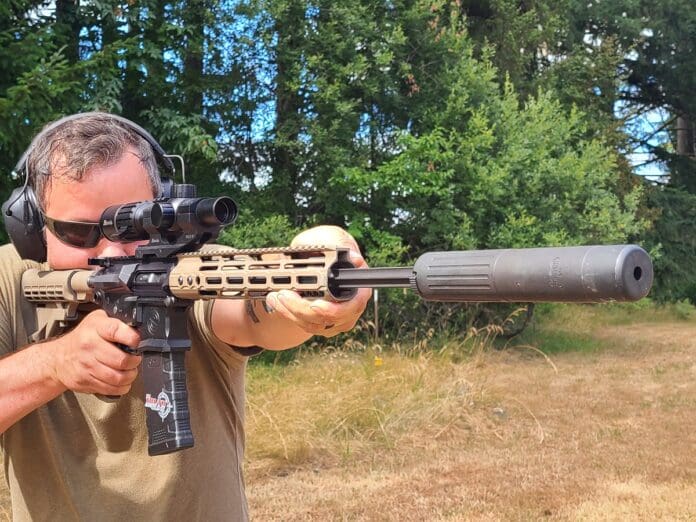
There are lots of options for barrels when you’re putting together your AR-15. There’s barrels, there’s Barrels and then there’s Barrels. While some go cheap, many will choose the mid-tier products, offering a blend of performance and affordability. X2 Dev Group has released their Trident barrel, a 416 stainless match barrel with a few extra features that they promise will be a sub-MOA, high performing barrel. Does it meet the expectations for a top flight barrel? Read on.
Tech Specs
- Length: 16 in., 14.5 in. and 12.5 in.
- Weight: 16 in.- 21.2oz., 14.5 in.- 19.7oz., 12.5 in. 17.8oz
- Caliber: .223 Wylde
- Twist Rate: 1:8
- Gas System Length: 16 in. Mid Length, 14.5 in. Mid-Length, 12.5 in. Carbine +1
- Gas Block Journal: .750 in.
- Material: Nitrided 416R Stainless
- Barrel Extension: Nitrided w/M4 Feed Ramps
- Muzzle: 1/2×28 Threaded
The Pitch
Here’s what X2 Dev Group has to say about their Trident barrels:
Sub MOA Guarantee with quality ammunition. Extreme rigidity ensures consistency and minimal POI shift when mounting suppressors. Specially-timed flutes act as opposing I-beams, blending structural integrity with reduced mass and maintaining optimal barrel harmonics.
Lightweight. Lighter than leading carbon fiber barrels and without the risk of delamination.
Nitrided for corrosion resistance and improved barrel life. Unlike barrel coatings, nitride impregnates the steel and does not independently wear with use.
Optimized Heat Profile. Consistent group dispersion up through 473 degrees Fahrenheit. Heat is evenly distributed along the barrel to reduce heat soak and stress. Combined with enhanced rigidity this feature enhances POI predictability through longer and higher-density strings of fire.“

Ok, that’s a lot to check out. What I’m looking for while testing this barrel is accuracy (of course), how it handles heat compared to an M4 cut barrel for reference and point of impact shift with a suppressor.
To get things started, I installed the barrel in a Silencer Co. SCO15 receiver set, with a V Seven Weapon Systems Enlightened handguard and an AAC 762SDN-6 suppressor mount. The Trident barrel has a couple nice divots for gas block set screws, if applicable.


X2 Dev Group mentions 77-gr. SMK ammo being used for sub-MOA testing in their AR-X Lightfighter rifle (which features the Trident barrel). I used Federal’s 77-gr. Gold Medal Match and Hornady’s 75-gr. Super Performance Match. These are the two heaviest and most consistently accurate rounds I have in this caliber.
To test function, break the barrel in (roughly) and check its ability to shed heat, I dumped a 30-round mag in 15 seconds. I compared its temperature after shooting to its temperature prior to shooting, and timed the barrel’s cooling ability over two minutes.


Ambient temperature: 87°F
X2 BBL starting temp: 83°F. After shooting: 298°F. After 2 minutes: 202°F (.7°F/second cooling)
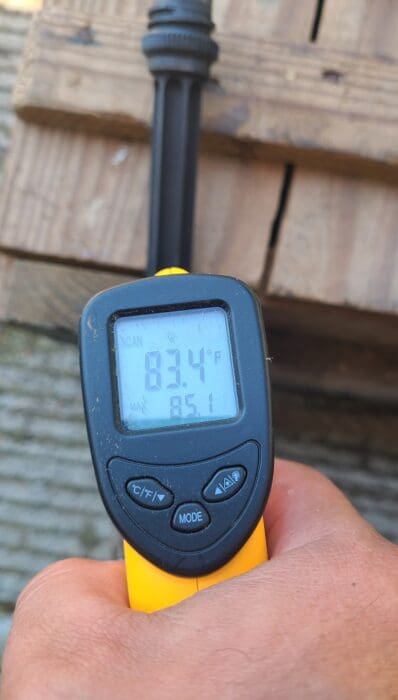

M4 Profile BBL starting temp: 83°F. After Shooting: 234°F. After 2 minutes: 201°F (.19°F/second cooling)
Looking at that bit of data, it’s not surprising that the much thicker M4-profile barrel heated up much less, there’s just a lot more material. What did surprise me what that despite heating up 63°F more, the X2 barrel ended up only one degree hotter after two minutes, cooling at a rate of 368% faster than the M4 profile.
So the X2 doesn’t soak heat like a heavier barrel… which I didn’t expect it would. It did cool extremely quickly, which means with a reasonable rate of fire I should get more shot-to-shot consistency.
POI Shift:
One of the features X2 Dev Group touts for the Trident barrel is how the timed flutes act as “opposing I-beams”. Specifically this is supposed to increase rigidity, helping to resist point-of-impact (POI) shift due to adding a suppressor.
I shot some steel with some bulk American Eagle 55-gr., I worked over my mini E-type target at 100 yards, did some CQB drills at 15 feet on my Infinite Defense Infinity Target, then shot a group at 50 yards.


I quickly screwed on the heaviest suppressor I own, an AAC 762SDN-6, and shot a couple rounds. At 20 ounces, this is a sturdily built .30-cal. can from yesteryear. This suppressor weighs a considerable amount more than the suppressors I usually run on 5.56 barrels, which weigh 11- and 13-ounces, respectively.
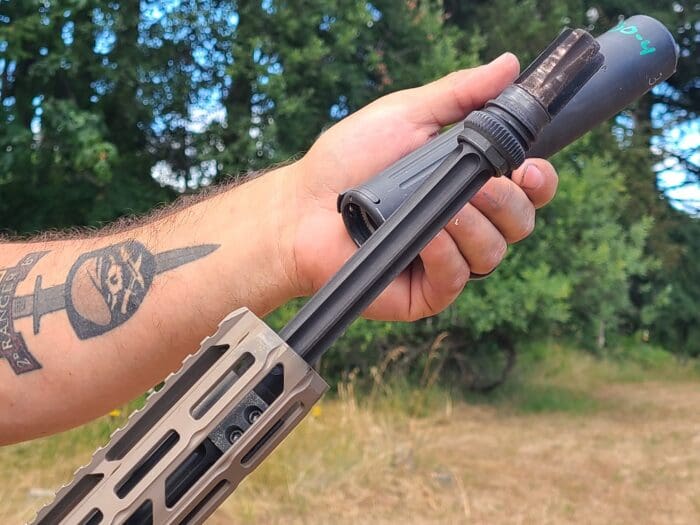

The can dropped the point of impact 1 moa straight down. I repeated this a few times and got the same result every time. Adjusting for a 1 MOA vertical drop is one of the easiest POI changes a guy can make, even at longer ranges.
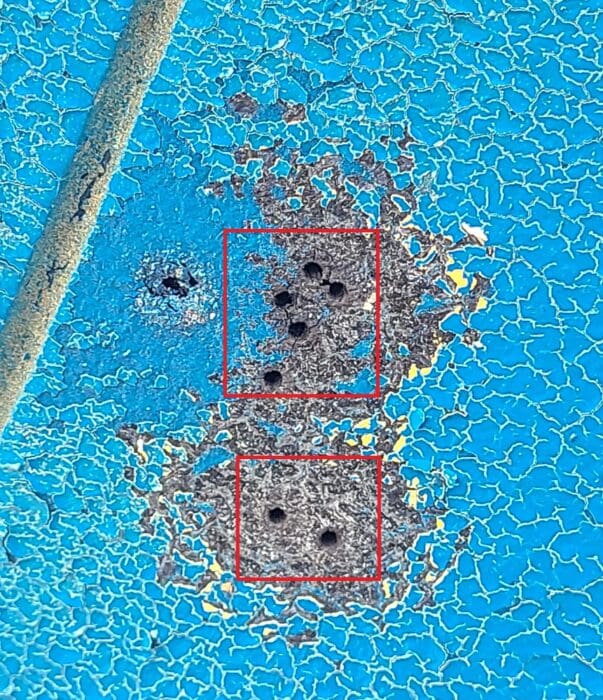

Compare this to the Faxon pencil profile barrel I used in an ultralight AR build, which had a 2 MOA down/right shift with an 11-ounce titanium can that got significantly more pronounced with only a dozen rounds.
Accuracy
The first rounds through this barrel were for the heating/cooling test and POI shift test listed above. While I’d shot a few groups for those, they were somewhat casual since I wasn’t testing max accuracy yet. So, I buckled down with the couple types of ammo I mentioned earlier, Hornady’s 75-gr. Super Performance Match, and Federal’s 77-gr. Gold Medal Match.
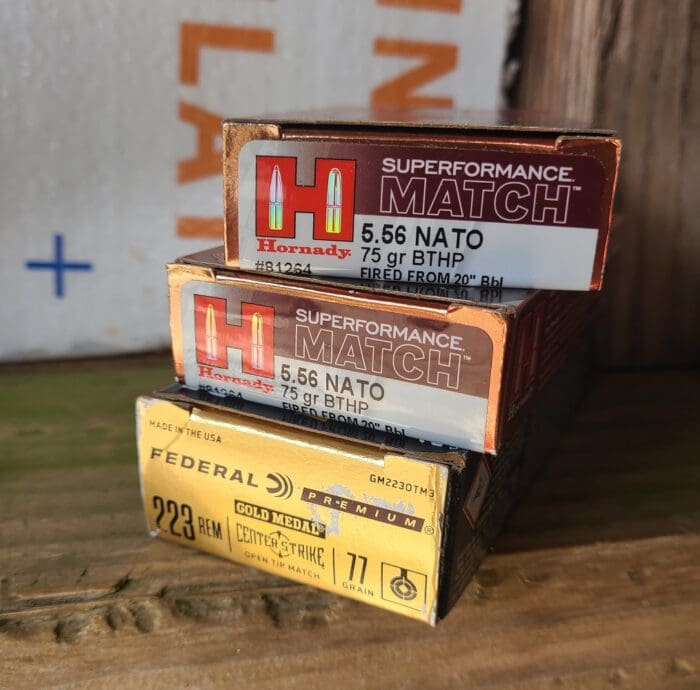

After shooting a few groups with each brand of ammo, I got my answers.
Shooting was done at 50 yards, with me standing while the rifle was on a Bog Deathgrip Tripod. It’s a pretty stable setup, but doesn’t top shooting from a bench with a rile rest like the Caldwell Stinger. (My bench is under repair.)
Starting with the 77-gr. Federal round, I shot 5-round groups and measured from the centers of the outermost rounds. The groups were .64 MOA, .42 MOA, and .99 MOA.
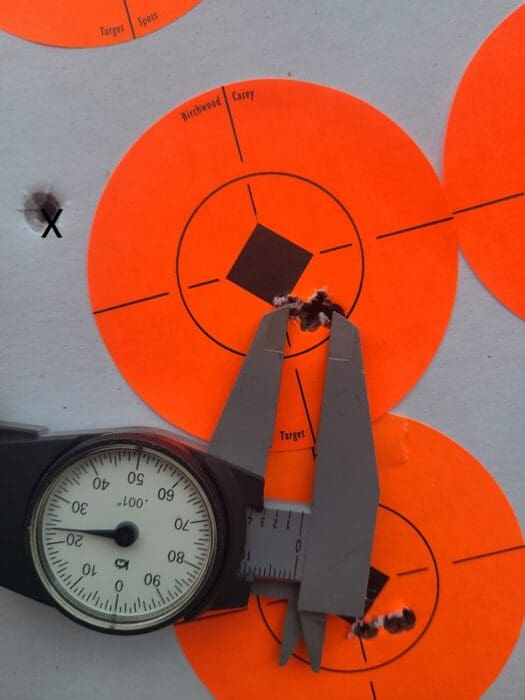

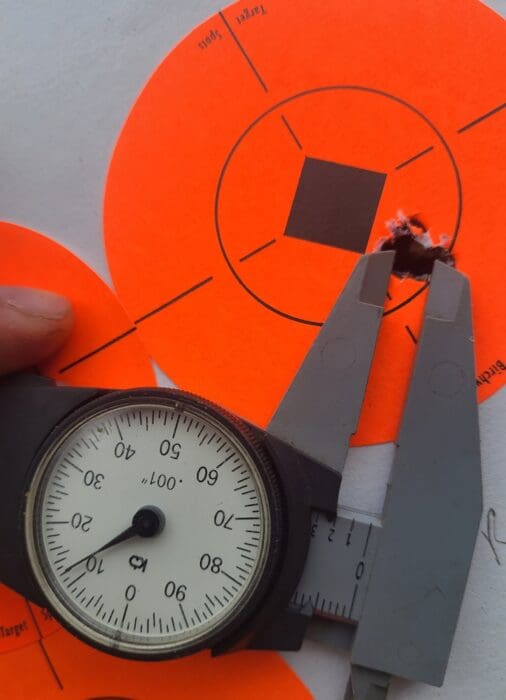

I changed ammo to the Hornday 75-gr. and started popping steel. I got carried away and only left three rounds for a group, which came in at .46 moa.
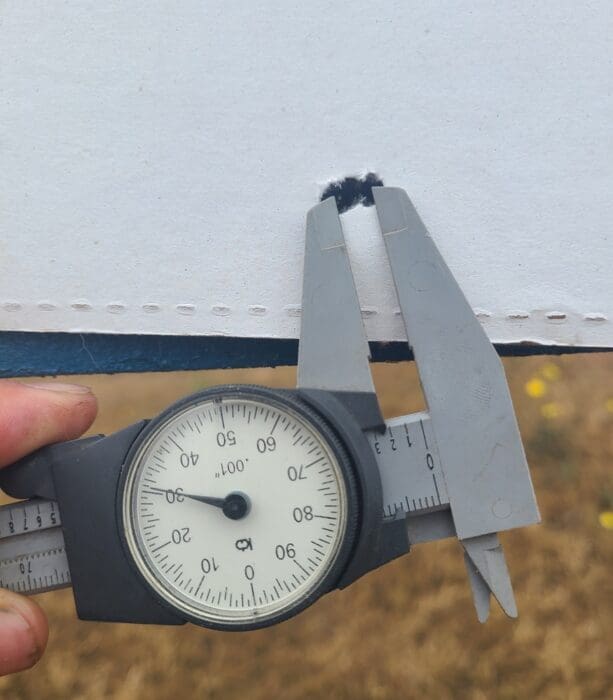

Bottom Line
The Trident barrel by X2 Dev Group isn’t meant to compete with your bargain barrels. Nor is it intended to be lined up with the “mid-tier” products. The Trident is clearly aimed at knocking out the premier carbon fiber barrels on the market. Considering that, the Trident’s $695-$899 price range (barrel length, gas block, gas tube options making the range) makes a lot of sense. With nitride treated stainless steel, the Trident can be expected to take a lot more abuse than most carbon fiber barrels will stand up to.
I’m considering this review a “work-in-progress” because I believe if you’re going to offer up a $695-$899 barrel package, it deserves a longer look than a few range days. I plan to get some better glass on this and shoot again from a rest, to eliminate the variable of the shooter as much as possible. So far the Trident has made good on every bit of the hype, delivering accuracy and an incredibly stiff profile.
If you’re looking for a good enough barrel to finish your build, there’s lots of good ones. If you’re wanting to explore what the highest ceiling of an AR15 barrel looks like, checking out X2 Dev Group’s Trident is well worth your time.
Check out more articles from Jens “Rex Nanorum” Hammer or visit him on Instagram @Rexnanorum.
Check out Ammo To Go, the ammunition retail sponsor of TTAG gun reviews and simply a cool online place to fulfill all your ammo needs.
Editor’s Note: All product and gun reviews are performed independently and product mentions made based on the quality of the product and value of interest to gun owners. We offer links to mentioned products as a convenience to readers interested in learning more about each product, as well as to provide a fast, easy way to purchase that item if desired. Please note when you buy through links on our site, we may earn a commission to help support the costs of operating our site and keeping it free for our visitors.
Read full article here

